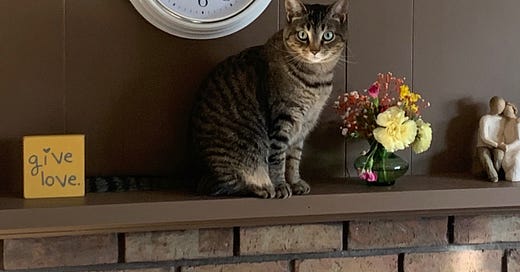Welcome back (or welcome)!
Sometimes we are surprised when simple things remind us of our loved one. And remind us of our loss.
Often, what I hear stated or implied is that something is wrong with us, or that we should be doing better than this by now. And those offering support second that emotion. Or offer prayer or a belief that these emotional ambushes will (and should) go away with time.
But what if these moments aren’t because something is wrong with us (I mean other than the main thing that’s wrong.)
In The Grieving Brain, Mary-Frances O’Connor suggests that in these moments, our brains are functioning in the way they are built to function.
Think about this.
In our daily life, we see things and we make connections. We build patterns. We develop responses.
When we burn our finger on a stove, we stay away from heat. When we like the sense of community when sit with a friend for an hour drinking our coffee, we develop a habit around coffee and talking.
When we know someone, those connections are often to that person. When I think of giving things up for Lent, I first think of watermelon and licorice, two things my friend starting in fourth grade talked about giving up. When I see Instagram pictures of espresso machines, I think of my friend Brian.
We call all of this “learning”.
If I were a psychologist, I’d give you more specific words, but I’m not.
When the person is someone we love, we build so many connections between that person and geography, music, odors, activities, or even odd biases for or against particular colors.
In the course of a day, or a week, or a year, that thing reminds us of that person. And we reach out. When I see an espresso machine video, I send it to my friend Brian.
And, that person reminds us of things. It can be funny, like when our two-year-old grandson wakes up from a nap at our house and sees me, he says, “Grandpa? Make coffee?”
It can be more complicated, like when seeing someone reminds us of tasks not completed, or pain.
When that person dies, we still have all the learned connections and responses.
We see or smell or go, and we remember them, but now we can’t call them or text. And so we’re reminded of the gap.
The answer to these sudden reminders is that there isn’t anything wrong with us. There isn’t anything to fix. There isn’t anything broken with our response, just with our heart.
What can happen is learning. Learning what to do when we remember our loved one. Learning to cry and to remember and to breathe. Learning that we are learning how to live in an identity that is different than, and deeply shaped by, our previous identity.
We’ll learn new routines, slowly, and we’ll be less surprised by the response.
It’s not that we won’t have the response, the tears, the sense of loss.
A perfume may remind us of our grandmother. A photo may remind us of a place and a conversation.
Our goal isn’t getting past the response.
Perhaps there is no goal in grief.
But there’s nothing wrong with us when we respond. Other than the thing that is wrong. And the fact that we are human.
+++
This post is the latest episode of Finding Words in Hard Times - the podcast.
Watch the video: 109 - Remembering your loved one is normal
Listen to the podcast: 109 - Remembering your loved one is normal
+++
Publication note
During June and July, I’ll be publishing this newsletter every two weeks rather than every week. You and I can both use the breathing space.
+++
Thanks for stopping by. And caring for others. And yourself.
Jon





